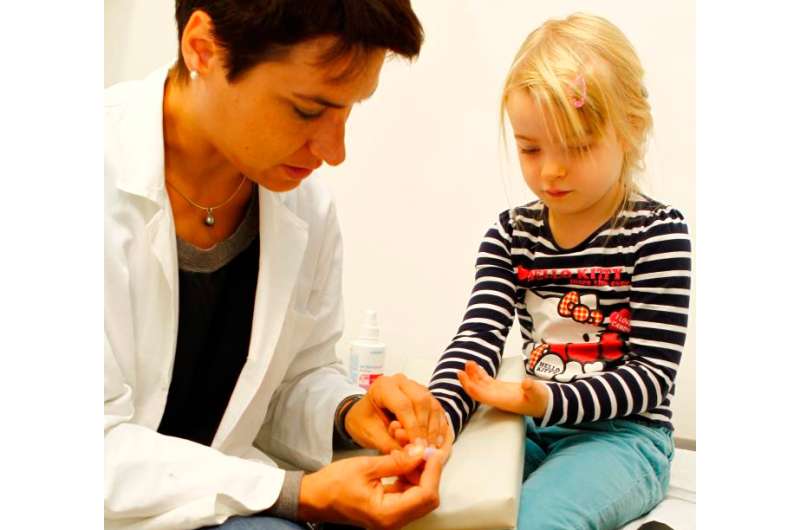First results of the Fr1da study—36,000 children already tested for early type 1 diabetes

One year after the introduction of the Bavarian pilot project Fr1da, the Institute of Diabetes Research, Helmholtz Zentrum München has published the first results in the BMJ Open journal. None of the 105 children who have been diagnosed with an early stage of type 1 diabetes have suffered from metabolic imbalance so far.
The Fr1da model project is unique by its magnitude in global diabetes research: A total of 100,000 children throughout Bavaria will be tested for beta cell autoantibodies, biomarkers of early type 1 diabetes, at their U7, U7a, U8 or U9 child health examinations performed by their pediatrician. Early detection of type 1 diabetes, when it is asymptomatic, can reduce the risk for life-threatening metabolic imbalance (ketoacidosis) and the admission to a hospital's intensive care unit, according to the first conclusion of the scientists at the Institute of Diabetes Research. Throughout Germany, every third child diagnosed with type 1 diabetes requires treatment for ketoacidosis at the time of the diagnosis, but so far none of the children who have been diagnosed with the Fr1da early detection test have suffered from metabolic imbalance.
"Thanks to the enormous support from the dedicated Bavarian pediatricians, implementation of the Fr1da Study has been extremely gratifying," reports Prof. Ziegler on the first results. "A screening test for early type 1 diabetes is feasible in this age group throughout the entire population." So far, 39 percent of all Bavarian pediatricians have participated in the project. At the time of the first data evaluation in November, 26,760 children between the ages of two and five years had been examined. This age group was chosen because, already at this age, 80 percent of patients who develop type 1 diabetes during childhood have 2 or more beta cell autoantibodies. An early stage of type 1 diabetes was diagnosed in 4 out of every 1000 children tested; 105 children in total so far.
"We are extremely optimistic with the latest data from the Fr1da study, and believe we are treading a new path of preventive health care," said Jessica Dunne, Ph.D., director and program lead for JDRF's Prevention Program. "We are grateful to the Institute of Diabetes Research. The success of this study marks a significant milestone and could help thwart the deadly condition of diabetic ketoacidosis (DKA) from occurring at full onset of the disease as well as to provide a framework for interventions to prevent type 1 diabetes from ever happening."
Parents overwhelmingly taking advantage of the teaching and care program
When diagnosed, the children and their families are offered participation in a four-hour teaching course in one of the 16 pediatric diabetes centers spread throughout Bavaria so that they may attend close to their homes. The families overwhelmingly take advantage of this offer: all but two families have chosen to participate. The experienced teams answered questions and helped the parents come to terms with the early diabetes diagnosis. In addition to factual information, many practical tips for day-to-day life were given. The illustrated Fr1da brochure that is provided to all families, prepares the families for future insulin treatment and day-to-day life with type 1 diabetes. Based on sound experience with patients, the brochure and teaching seeks to convey a positive outlook of life with type 1 diabetes so that the parents and children are provided security and feel cared for.
A focus on the emotional condition of the families
An important measure undertaken in Fr1da is how effectively knowledge is conveyed to the teaching course participants and how well the families are able to come to terms with the diagnosis. Standardized psychological questionnaires supplemented by personal discussions are used to assess this. A first assessment showed that, not unexpectedly, no parent was unaffected by the diagnosis in their child. However, thanks to the care and support provided within the study, there have so far been no indications that the mothers, fathers or children have suffered from severe emotional stress.
"With the Fr1da Study we want to set new standards in the diagnosis and treatment of type 1 diabetes by a diagnosis in the early, asymptomatic stage, and the provision of comprehensive medical and psychological care for the affected families," Ziegler states.
More information: Jennifer Raab et al. Capillary blood islet autoantibody screening for identifying pre-type 1 diabetes in the general population: design and initial results of the Fr1da study, BMJ Open (2016). DOI: 10.1136/bmjopen-2016-011144



















